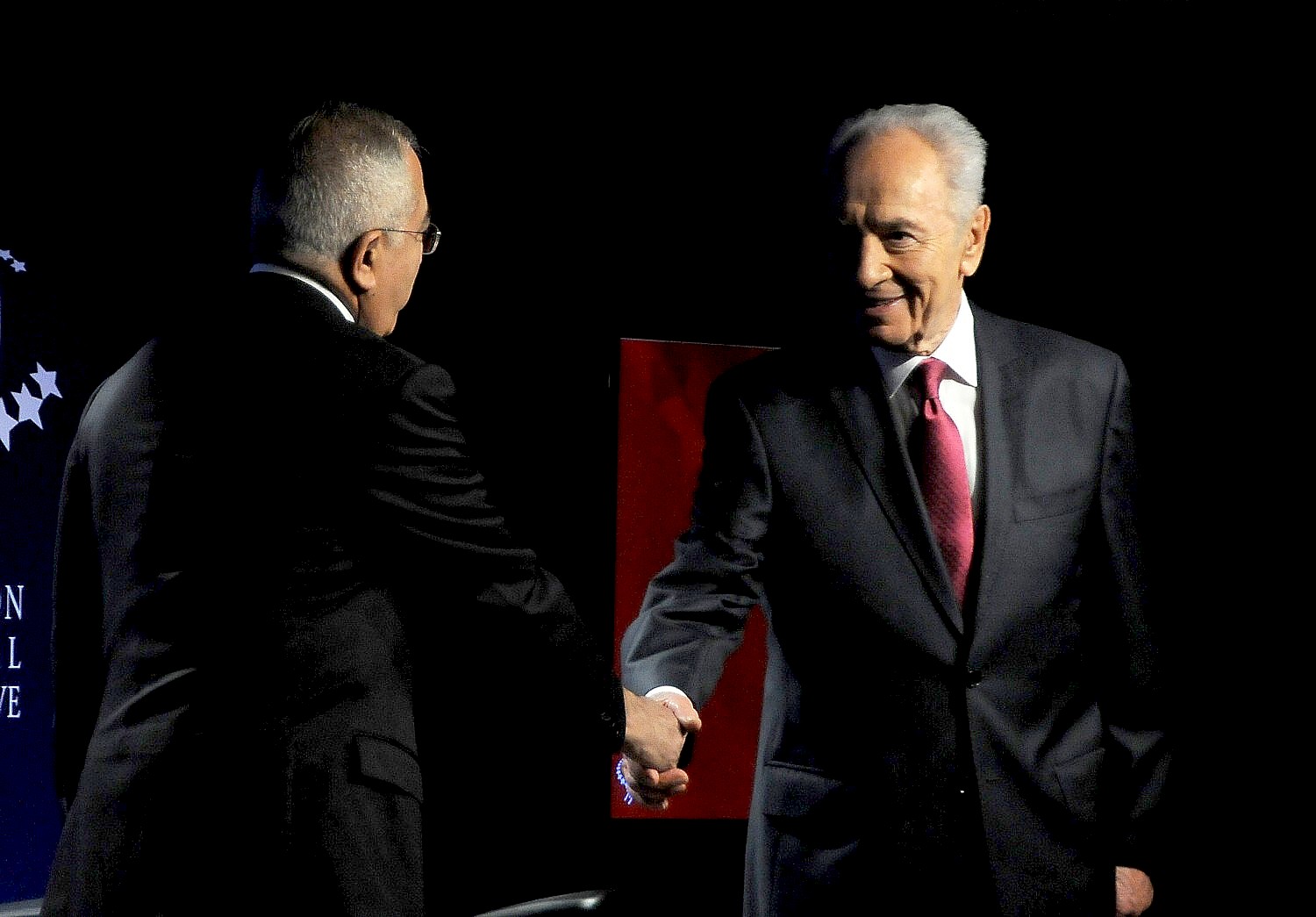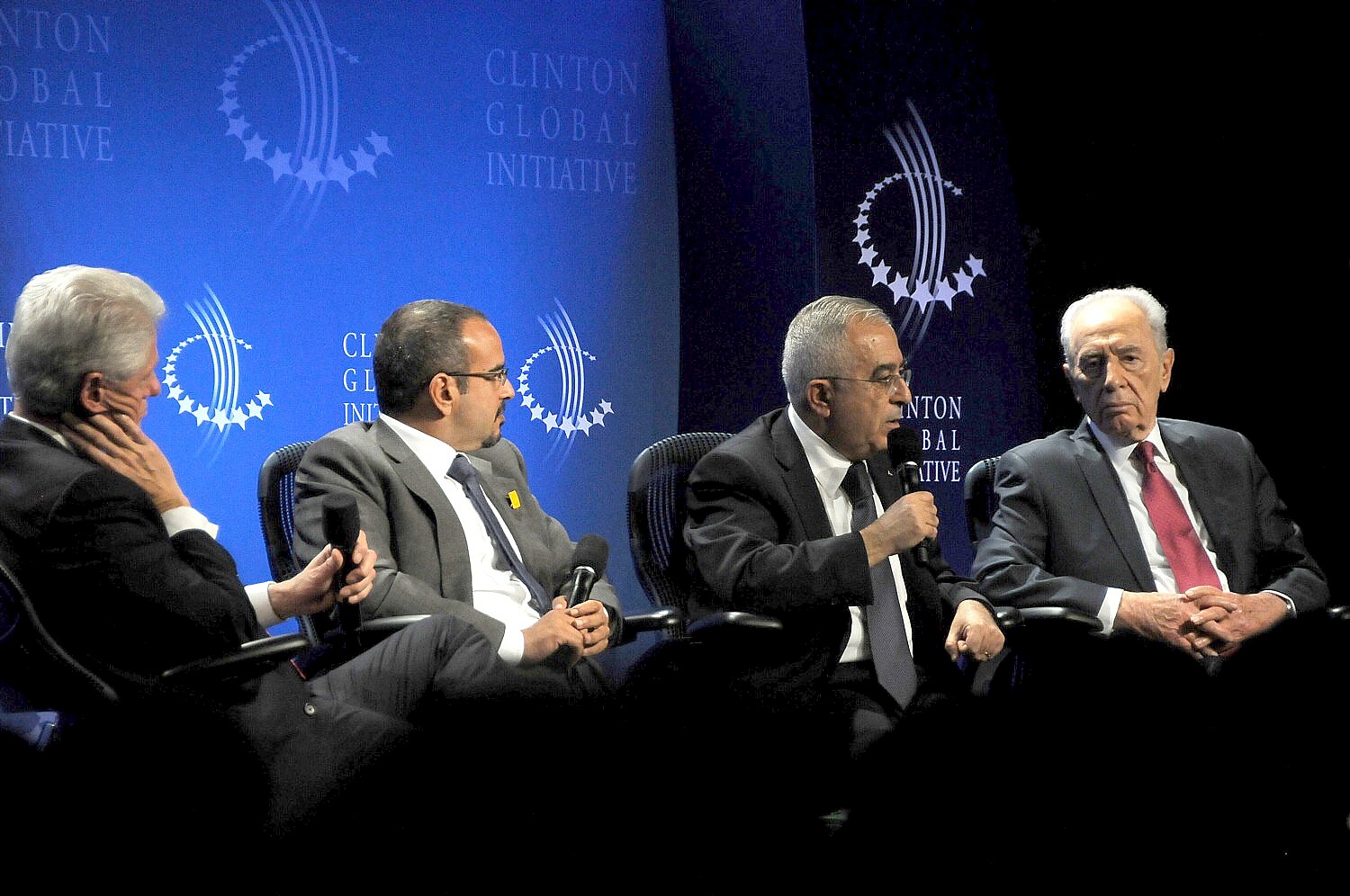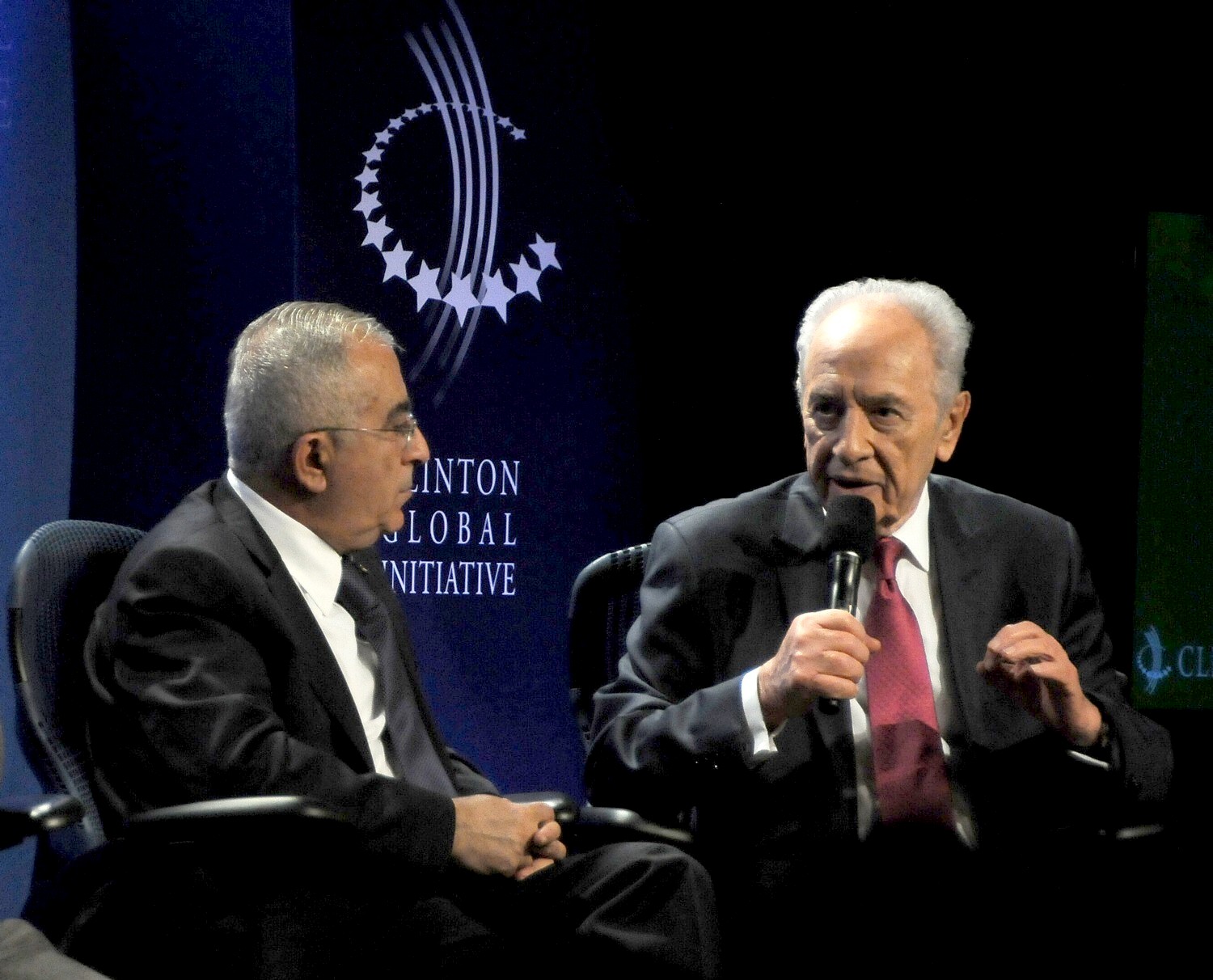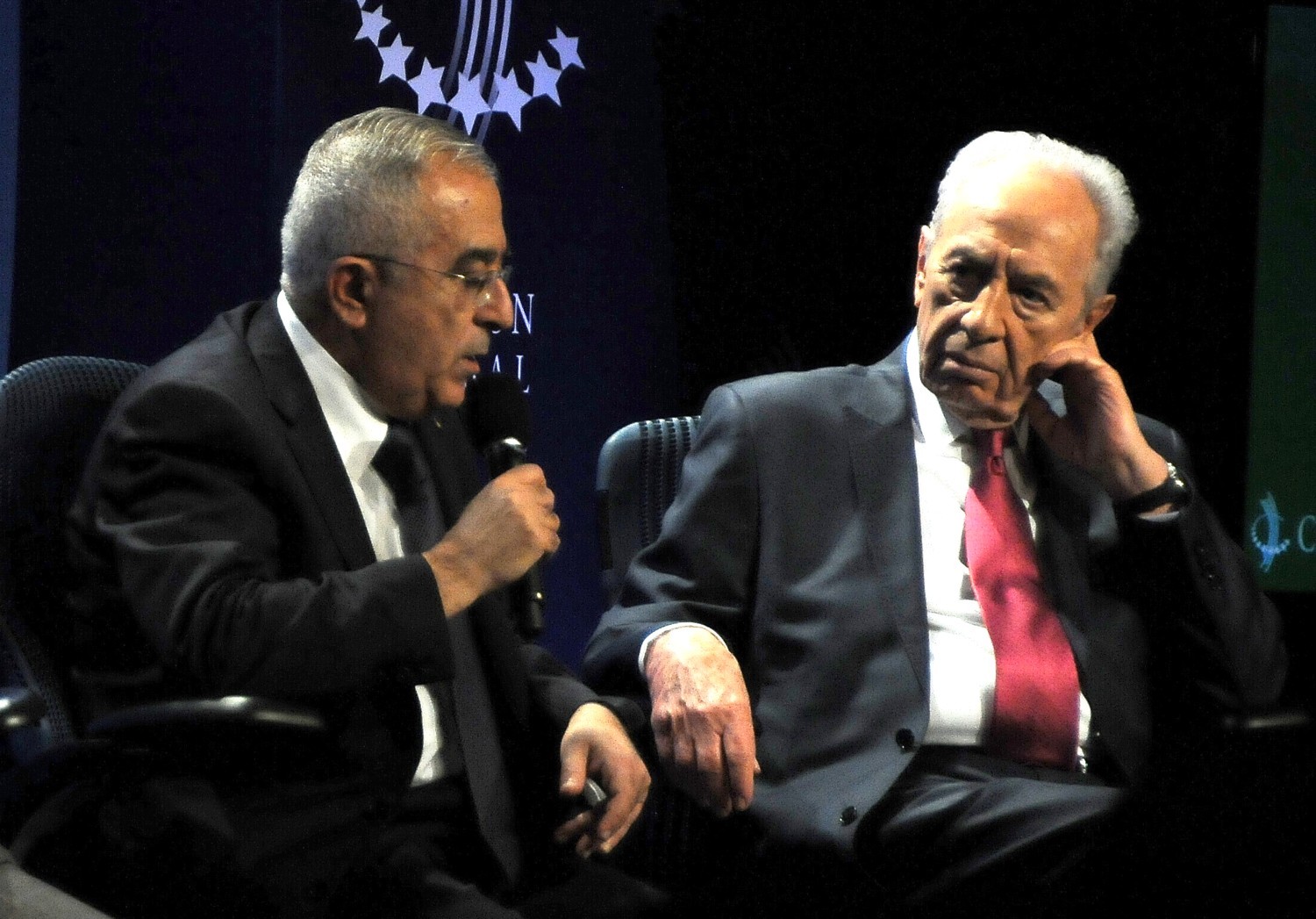
By Karen Rubin, News & Photo Features
As we mark the passing of Shimon Peres, the former President of Israel, who New York Times in its obituary called A Pillar of Israel, From Its Founding to the Oslo Accords, I reflect back on what was very possibly the closest Israel and Palestine ever came to forging a true peace, and it came during the 2010 Clinton Global Initiative, when Peres sat next to Salam Fayyad, Prime Minister of the Palestinian National Authority, on a panel with President Bill Clinton and Bahrain’s Crown Prince and Deputy Supreme Commander Salman bin Hamad Al-Khalifa and provided a roadmap to cooperation. Here’s my column from that panel, on September 21, 2010:
Israel, Palestine Leaders Offer Vision of Peace – and It Looks Real
Prayers for peace in the Middle East are a ritual in Great Neck, and for one hour last week at the Clinton Global Initiative, a vision for peace seemed less than a perennial dream, and took the shape of a real prospect.
During a special session at the Clinton Global Initiative, which brings together world leaders, business moguls, philanthropists and do-gooders who labor at nongovernmental organizations, the President of Israel and the Prime Minister of the Palestinian National Authority painted their vision of what peace would look like: a vast economic region with joint projects including a water pipeline crossing the Red Sea to the Dead Sea, modern irrigation techniques that could make the Palestinian desert bloom as it does in Israel, even a regional electric grid, and an economic boom that could snuff out the anger that fuels terrorism. There would even be equality for women.

And for that hour, it all seemed within grasp, with the Bahrainian Crown Prince giving his imprimatur to how the whole region would benefit from a peace “dividend.”
But just days after, the expiration of Israel’s 10-month moratorium on settlement building in the disputed territory of the West Bank which brought out jubilant and triumphant settlers who released white-and-blue balloons, has burst that bubble of optimism over whether the Palestinian Authority will follow through on its threat to pull out of this latest effort at peace negotiations.
Still, the Palestinians seemed to hang in there as the Obama Administration – Sec. Hillary Clinton and special envoy George Mitchell – were frantically trying to keep things together.
Here’s why this time might be different: the leaders were able to specify the economic and social benefits.
What is more, the body language looked good.
Salam Fayyad, Prime Minister of the Palestinian National Authority and Shimon Peres, President of the State of Israel shook hands, genuinely, then took seats next to each other, rather than bookending President Bill Clinton and HRH Prince Salman bin Hamad Al-Khalifa, Crown Prince and Deputy Supreme Commander of the Kingdom of Bahrain. Seated elbow to elbow, Fayad and Peres looked straight into each other’s faces when the other was speaking. Mostly.
President Clinton posed the question to the Prime Minister first: “Assume that the parties come together, and don’t want to wait another decade, what would peace look like?”
Fayyad, offered his vision of what peace would look like in the state of Palestine, but when I heard him say “Jerusalem as its capital” I thought the session would end as quickly as it began, or veer off. But Peres never addressed the remark; his body language did not change.
But Fayyad continued: “What the region might look like minus the conflict? The vast economic potential – the region looks like a single economic space. ..vast growth potential, that can be exploited by dealing with elements that impeded commerce across state lines…That’s the kind of region that I believe can emerge after so many decades of conflict, with obvious benefits – for Arabs, Israelis and the rest of the Arab world.
“Amongst the possibilities: infrastructure improvements that cut across borders. Several have been on the drawing board – one is [close to] the heart of Shimon Peres – a project intended to link the Red Sea to the Dead Sea, to deal with ever shrinking [water supplies] that threatens to make it even more dead than it is. That’s one project that could happen..even before the conflict over. Something that could prepare for a better future. There are a lot of projects of direct benefit, cutting across boundaries in the region – in the area of energy, electricity, regional power grid….
“We could devote more energy, time and resources to bring about development –economic, socially, culturally. [Peace] would remove all the obstacles to interact with the rest of humanity on the basis of shared values, equal opportunity, no discrimination against women… ”
Women’s rights, Fayyad said “is something that unfortunately has caused us a lot of problems in region and around the world. The problem has to be addressed not only because of vast potential if women are afforded opportunity, but because it’s the right thing to do… ”
Then to Peres, Clinton said, “Suppose peace was made 3 or 4 days ago. What does Israel want out of it, what can Israel do to make sure it takes hold In order to make sustainable peace? [Particularly in the area of food production]… Today you can produce food not by size or land but science and technology. There is almost no water, yet [Israel’s] agriculture produces eight times more from same acre than 50 years ago.”
Technology has unleashed economic development throughout the developing world, and can do its magic in the Middle East, as well. Sharing Israel’s innovations with the Palestinian state would be a key benefit of the peace dividend, Peres offered.

“One thing both of us agree – not just governmental intervention but private initiative…we all are ready to accept high tech in their countries- that has nothing to do with territory… it’s global,” Peres said. “The two young boys that created Google didn’t hurt anyone…[technology] can build an economy, and I think that should be the first…. We are ready in Israel to share what we have. Our high tech started with agriculture. You can have it the next morning, and provide food to the children. That’s number one, after peace. Number two is health. ..There is no hospital in Israel where you don’t have Arab doctors and Arab patients…. If we can live in peace in hospital, why can’t we live in peace out of hospital?
“Next: Education. The moment we have peace is the moment we can provide for education.
“Other things: Tourism. Tourism accounts for 17% of world economy, and we have everything to attract the largest amount of tourists but peace. If we shall make peace – with the Palestinians and the Jordanians, have enough points of attraction to promote ..
“Water. We are saving half of the water that is being used elsewhere. By irrigation, by recycling, by introducing vegetation that don’t drink so much water, using electronic controls. All of this is available.
“Now when it comes to electricity – the choice is that everyone will build a nuclear reactor for electricity… The greatest nuclear reactor in the world is the sun. The sun is democratic, open to everyone. We know already how to produce solar energy, but not to produce it in a competitive way. We believe by [marshalling] solar energy…. it would enable us to be natural, would be cheaper…and give the people water and electricity..
“We introduced ‘drip irrigation,’ now we have ‘drip electricity’ – we can move electricity from one place to another without physical connection.” [Israeli companies have developed a technology that transmits electricity the same way, over the same architecture, as wireless voice communications.]
“We can send electricity 2-4 miles away, and it can reach the target. It is quite revolutionary,” he said.
“I believe that the future, that the most sensational 10 years in human life will occur because of the level of computerization.”
President Clinton noted that even in this economic downturn, Israel has done well, “and most certainly will be the first to have 100,000 electric cars on the road.”
Israel and Palestine have a lot to gain from a peace dividend, but how might countries in the region like Bahrain benefit? Will there be a regional economy, and what does that mean for you? President Clinton posed to Prince Salman.
“Our region is caught between the rule of the gun and the rule of Koran, captive market and capitalist markets, pluralism and plutocrats,” Prince Salman said. “The region has been held back by the negative. In every choice, people have singled out their fear, mistrust, disappointment, in the ability of governments to achieve the dignity they [deserve]. We must achieve this peace – because the future is very bright.”
He said that the region represents a $1 trillion market, and by 2020 will be a $2 trillion market…”It grew at 70% in the last 8 years, 40% [of exports] go to the region, so you can start to see that regional economic cooperation is a reality… and if we can build on what President Peres said about science… that the world in 15-20 years will be fundamentally different, then the future will be bright, whether agriculture, medicine, productivity. I am very optimistic…. the ease by which we can communicate, the productivity we have gained… in the development of human history, this is a flash, a spike.
“We will be cooperating, the dislocations that shake us, to our core, will be absent. ….It is a future I see very much in a positive way…. That I will dedicate myself to, to come true, and one in which all of us have a role to play.
“The private sector in US., government in Middle East. We must all believe in this process, make the hard choices that need to be made, and when the process looks shaky, that we are there to support it. Thank you Mr. President, for getting us here today, and even though I am on the periphery and not a direct negotiator, my life, my children’s lives will be immeasurably better.”
Giving a vision of hope, Peres suggested it might finally be time. “In Europe, if someone would have stood up in 1943 that in 30-40 years, Europe would be united, people would laugh. It took generations for French, Germans, British to come together. The young people, anyway, live in a different world. They are connected personally. The world is more connected, and the younger you are, the more connected.
“Today the greatest choice before the Middle East is either to be a Middle East of independent states or fall under the spell of Iranians,” Peres said. “This is the greatest danger. Under the spell of Iranians is also terror. We have a common menace, if not a common enemy, so we have a common purpose.
But Clinton noted, “If the vision [for peace and regional cooperation] you are sketching out takes hold, the Iranians would have a very different choice than they do today. It would maximize that the current fears we have can be resolved in a peaceful way, and maximize the risk if they choose not to do that.”

“I think [peace] would be better for everyone,” said Fayyad. “People throughout the region could interact more freely – in peace, security. We could focus on doing things better, governing better, providing services more effectively. Our economy is only 4% the size of the Israeli economy – that alone, even if you don’t factor in what this means in regional cooperation, and better access to rest of region — simply by virtue of sitting alongside such a huge economy, that is Israel. When you begin to factor in other benefits – tranquility, civility in the region, you can see how the benefits would begin to spread. That would happen on the strength of having some serious partnerships here.”
Halevay (It should only happen).
–Karen Rubin, Columnist
________________________________
© 2016 News & Photo Features Syndicate, a division of Workstyles, Inc. All rights reserved. For editorial feature and photo information, go to www.news-photos-features.com, email [email protected]. Blogging at www.dailykos.com/blogs/NewsPhotosFeatures. ‘Like’ us on facebook.com/NewsPhotoFeatures, Tweet @KarenBRubin
